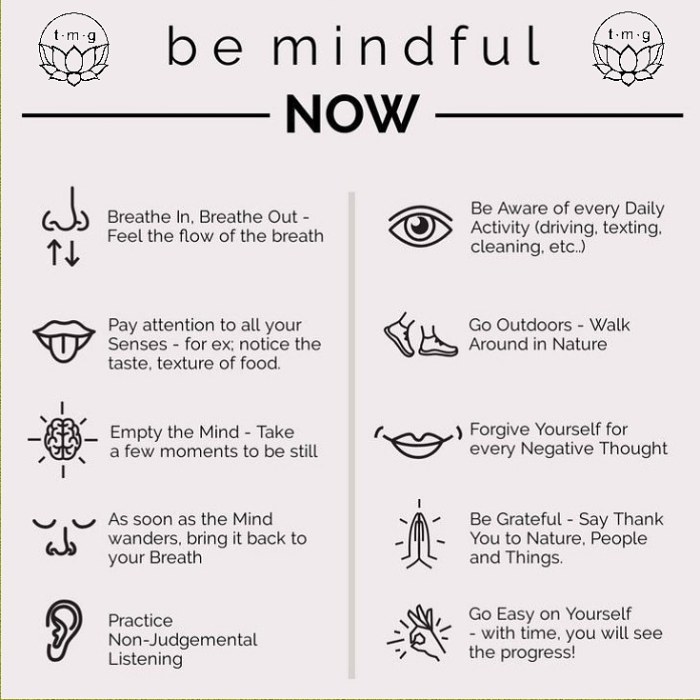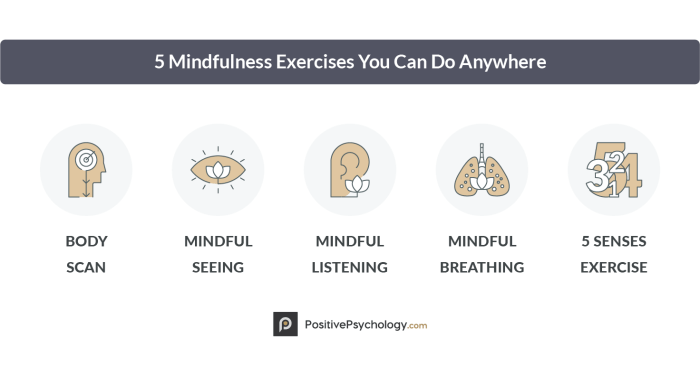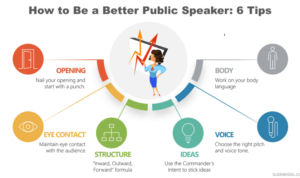Mindfulness Exercises introduce a path to inner peace and clarity, offering a journey towards improved mental health and overall well-being. Dive into the world of mindfulness practices that can transform your daily routine and mindset.
What are Mindfulness Exercises?
Mindfulness exercises are practices that focus on bringing attention to the present moment without judgment. The purpose of these exercises is to help individuals cultivate awareness, reduce stress, improve concentration, and promote overall well-being.
Benefits of Mindfulness Exercises
- Enhances self-awareness and emotional regulation
- Reduces anxiety and depression symptoms
- Improves focus and cognitive function
- Promotes relaxation and stress management
Examples of Mindfulness Exercises
- Deep Breathing: Inhale deeply through your nose, hold for a few seconds, and exhale slowly through your mouth. Repeat several times to calm the mind and body.
- Body Scan: Focus on each part of your body from head to toe, noticing any tension or discomfort. Relax each body part as you go along.
- Mindful Walking: Pay attention to each step you take, the sensation of your feet on the ground, and the surrounding environment. Stay fully present in the moment.
Benefits of Mindfulness Exercises
Practicing mindfulness exercises offers a wide range of mental health benefits that can positively impact overall well-being and reduce stress levels. By cultivating mindfulness, individuals can enhance their cognitive abilities, emotional regulation, and attention span, leading to improved mental clarity and resilience in facing life’s challenges.
Mental Health Benefits
- Reduces symptoms of anxiety and depression by promoting a sense of calm and emotional stability.
- Enhances self-awareness and self-compassion, fostering a positive relationship with oneself.
- Improves focus and concentration, leading to increased productivity and cognitive performance.
- Boosts overall mental resilience, helping individuals cope with difficult emotions and situations more effectively.
Impact on Stress Reduction, Mindfulness Exercises
- Mindfulness exercises help individuals manage stress by promoting relaxation and reducing the activation of the body’s stress response.
- Regular practice of mindfulness can lower cortisol levels, the stress hormone, leading to a calmer and more balanced state of mind.
- By cultivating present-moment awareness, individuals can prevent rumination and worry, which are common triggers for stress and anxiety.
Personal Experiences
“Since incorporating mindfulness exercises into my daily routine, I have noticed a significant decrease in my overall stress levels. I feel more grounded and present in each moment, allowing me to approach challenges with a clear mind and a sense of inner peace.”
“Practicing mindfulness has transformed my outlook on life and how I relate to others. I now approach situations with greater empathy and understanding, leading to stronger and more fulfilling relationships.”
How to Practice Mindfulness Exercises

To start practicing mindfulness exercises, follow these steps to incorporate mindfulness into your daily routine and create a conducive environment for practice.
Start with Simple Breathing Exercises
- Find a quiet and comfortable place to sit or lie down.
- Close your eyes and focus on your breath, taking slow deep breaths in and out.
- Pay attention to the sensation of your breath entering and leaving your body.
- Continue breathing mindfully for a few minutes, letting go of any distractions or thoughts.
Body Scan Meditation
- Lie down on your back with your arms by your sides and close your eyes.
- Start by bringing your awareness to your toes, then slowly move your focus up through your body, scanning for any tension or discomfort.
- Relax each part of your body as you scan, releasing any tension you may find.
- Take your time to scan your entire body, from your toes to the top of your head, staying present in the moment.
Mindful Walking
- Choose a quiet and peaceful place to walk, either indoors or outdoors.
- Start walking at a slow pace, paying attention to each step you take.
- Notice the sensation of your feet touching the ground and the movement of your body as you walk.
- Stay present and focused on the act of walking, letting go of any distractions or wandering thoughts.
Creating a Mindful Environment
- Designate a specific time and place for your mindfulness practice each day.
- Minimize distractions by turning off your phone and finding a quiet space free from interruptions.
- Add elements like candles, soft lighting, or calming music to enhance your mindfulness experience.
- Set an intention for your practice and approach it with an open mind and a sense of curiosity.
Mindfulness Exercises for Specific Situations

When it comes to dealing with specific situations like stress, lack of focus, or poor sleep quality, mindfulness exercises can be a powerful tool to help you navigate through these challenges with more ease and clarity.
Stress Relief
- Practice deep breathing exercises to calm your mind and body. Inhale deeply for a count of four, hold for four, and exhale for a count of four.
- Try body scan meditation to release tension. Start from your toes and progressively move up, focusing on each body part and relaxing it.
- Engage in mindful walking by paying attention to each step you take, grounding yourself in the present moment.
Improved Focus and Concentration
- Use the 5-4-3-2-1 technique to sharpen your focus. Name 5 things you can see, 4 things you can touch, 3 things you can hear, 2 things you can smell, and 1 thing you can taste.
- Practice mindful listening by fully concentrating on the sounds around you without any judgment or interpretation.
- Try the “STOP” method: Stop what you are doing, Take a breath, Observe what is happening around you, and Proceed with your task mindfully.
Promoting Better Sleep Quality
- Engage in a body scan meditation before bedtime to release any tension or stress accumulated during the day.
- Practice progressive muscle relaxation by tensing and relaxing each muscle group in your body, starting from your toes up to your head.
- Try a loving-kindness meditation to cultivate feelings of compassion and positivity before going to sleep.









